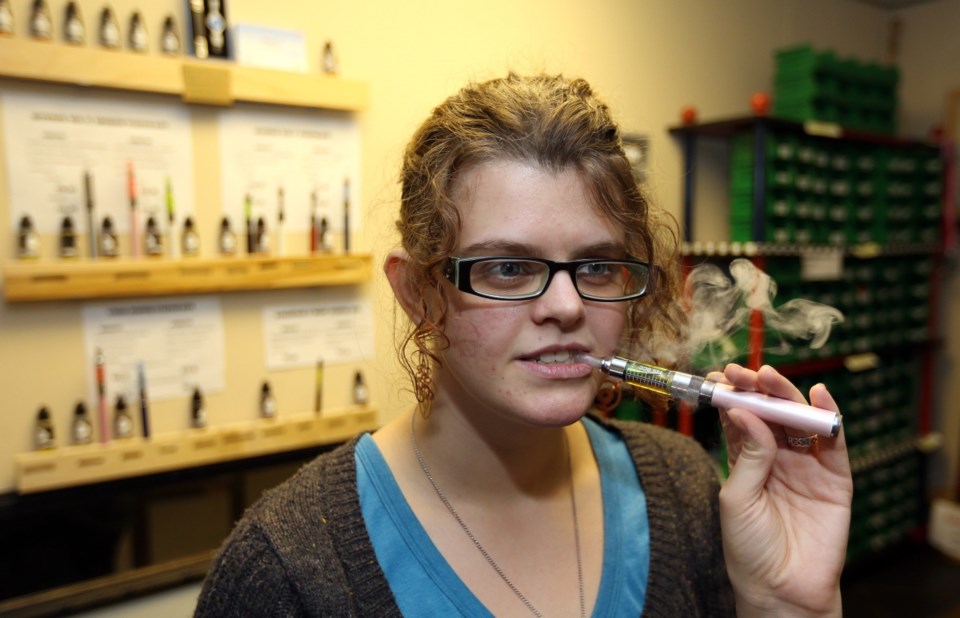Saanich business owner John Overall is fighting a cease-and-desist letter from Health Canada that claims selling nicotine e-juice at his electronic-cigarette store is a violation of the Food and Drugs Act.
The federal agency has only issued an advisory on e-cigarettes, which produce a vapour from nicotine serum, said Overall, owner of Northern Vapers at 3946 Quadra St. The electronic devices are not approved by Health Canada, but there are no laws banning or regulating them.
“They haven’t taken a clear stand themselves,” he said.
“Now they’re trying to push businesses like mine to shut down, claiming it’s illegal,” said Overall, one of many e-cigarette vendors across the country to receive the warning from Health Canada.
In the letter, Health Canada states: “Nicotine is a highly addictive and toxic substance … electronic smoking products may pose risks such as nicotine poisoning and addiction.” The agency says the product is being marketed and sold as a drug as defined by the FDA.
Overall said he does not market e-cigarettes as a health product or a drug. He notes the act provides an exemption for nicotine “administered orally by means of an inhalation device delivering 4 mg or less of nicotine per dosage.” One vape, or dose, from an e-cigarette cannot produce this amount, Overall said.
He opened his shop six months ago after selling e-cigarettes online. A heavy smoker for 30 years, Overall quit after his first e-cigarette two years ago.
“Since then, I breathe better and my [sense of] smell has returned,” he said. “And you can smoke it anywhere.”
This might not be the case for long, as lawmakers and health officials try to catch up with the booming popularity of e-cigarettes. Even Overall chooses not to sell to minors, though there’s no law against it.
In the U.S., the $1.5-billion-dollar industry has tripled in the past year and use has doubled among middle and high school students, according to the Centers for Disease Control and Prevention.
“There’s definitely some of the cachet and coolness cigarettes once enjoyed,” said Dr. Richard Stanwick, Island Health chief medical health officer. “Like Humphrey Bogart might light two e-cigarettes and pass it to a lady.”
Stanwick said the increasing popularity of e-cigarettes has him and other health professionals very concerned, despite the product’s benefits for long-time smokers trying to quit.
“There’s no question it isn’t on par with smoking tobacco, but nicotine is highly addictive and toxic,” he said. A dose of nicotine, ingested or absorbed through the skin, is fatal at 10 milligrams for a child and 60 for an adult.
“Ultimately, it can result in convulsions and a really ugly death.”
Stanwick said the current grey area of e-cigarettes is bound to change as policy and research into health effects catch up with the trend.
“The evidence is chasing the product,” he said, comparing the teens using e-cigarettes today to heavy smokers who got hooked in their teens during the 1960s and 1970s.
Already, the European Union has ruled the products need more health warnings and regulation, the mayor of New York is seeking a ban, and Nova Scotia is promising to move quickly on regulations.
Cort Smith operates his online e-cigarette business, Rare Air Cigs, from Victoria, but does not sell the nicotine e-juice.
He hasn’t received a warning from Health Canada, but he said if he does, he plans to dispute it until the products are properly regulated.
“I’m sure that’s coming down the line,” he said. “Once pharmaceutical companies figure out how to monetize this, we’ll see regulations — and they won’t favour the little guys like me.”
Health Canada did not respond to requests for comment.



